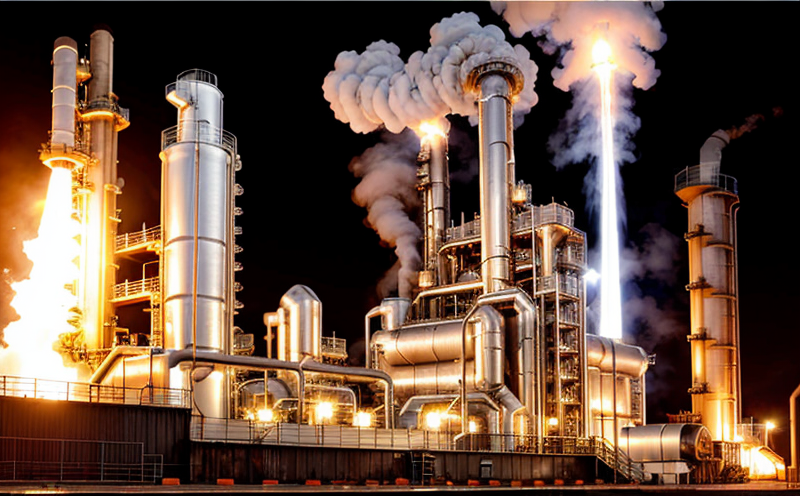ISO 16592 Metallurgical Refining Control Testing
The ISO 16592 standard is a critical tool for metallurgists and material scientists working in refining processes. This testing method ensures that metals are refined to meet stringent quality standards, enhancing product reliability and customer satisfaction. The process involves several steps including sample collection, preparation, analysis using various instruments, and final reporting.
The primary focus of ISO 16592 is on the determination of metallic impurities in iron and steel products through neutron activation analysis (NAA). This method provides precise quantification of trace elements which are crucial for quality control. The standard aims to identify these impurities at levels as low as a few parts per million, ensuring that any deviations from desired purity can be detected and addressed promptly.
Metallurgical refining processes often involve multiple stages where different types of impurities may accumulate or be introduced. By using ISO 16592 testing early in the process, industries can proactively manage these variables, leading to improved product consistency and reduced costs associated with rework or scrap. The standard supports both batch and continuous production environments, making it versatile for various industrial applications.
Sample preparation is a critical step in this testing method. Typically, samples are taken from the final stages of refining where impurities are most likely concentrated. These samples must be representative to ensure accurate results. After collection, they undergo rigorous cleaning processes to remove any contaminants that could affect the analysis. Once prepared, these samples are ready for neutron activation analysis.
The actual testing process involves irradiating the sample with neutrons in a nuclear reactor or using an accelerator-based neutron source. This induces radioactive isotopes of elements present in the sample, which then decay and emit gamma radiation characteristic of each element. The intensity of this radiation is measured to determine the amount of each impurity.
Accurate reporting based on these measurements is essential for effective quality control. Reporting typically includes detailed data on detected impurities along with their concentrations. Compliance officers can use this information to adjust refining processes, ensuring adherence to specified limits set by industry standards and customer requirements.
The benefits of adhering strictly to ISO 16592 are manifold. It not only enhances product quality but also improves efficiency within the manufacturing process. By identifying issues early in the refining stages, companies can minimize waste and reduce costs associated with rework or scrap. Additionally, this standard fosters a culture of continuous improvement by encouraging regular audits and updates to refining processes.
For R&D engineers, ISO 16592 provides valuable insights into potential improvements for existing refining techniques. Understanding the specific impurities present in different batches allows for targeted research aimed at eliminating or reducing these contaminants. In procurement, this standard ensures that only high-quality raw materials are used, which is crucial for maintaining consistent product quality throughout the supply chain.
Compliance officers play a pivotal role in ensuring adherence to this standard within their organizations. They oversee implementation of testing procedures and ensure that all relevant stakeholders understand its importance. Regular training sessions on proper sample preparation and interpretation of results help maintain high standards across teams involved in metallurgical refining activities.
Industry Applications
| Industry Segment | Application |
|---|---|
| Aerospace | Ensuring lightweight components meet stringent purity requirements for durability and performance. |
| Automotive | Improving fuel efficiency by optimizing metal composition to reduce weight without compromising strength. |
| Battery Manufacturing | Guaranteeing the safety and longevity of batteries through precise control over metallic impurities. |
| Construction | Achieving higher strength-to-weight ratios in structural materials like steel beams for safer buildings. |
- Electronics Manufacturing: Enhancing component reliability by minimizing contamination from trace metals that could interfere with circuit performance.
- Petrochemicals: Ensuring the integrity of pipelines and other equipment used in refining processes to prevent leaks and ensure operational safety.
The wide range of applications highlights the versatility and importance of ISO 16592 testing across various sectors. This standard ensures that metals used in these industries meet the highest quality standards, thereby enhancing product reliability and customer satisfaction.
Eurolab Advantages
At Eurolab, our commitment to excellence is reflected in every service we provide. For ISO 16592 Metallurgical Refining Control Testing, we offer several advantages that set us apart:
- Accurate and Reliable Results: Our state-of-the-art facilities equipped with advanced neutron activation analyzers ensure precise measurements of trace elements.
- Comprehensive Reporting: Detailed reports provide a comprehensive overview of detected impurities, helping clients make informed decisions about their refining processes.
- Expert Technical Support: Our team of experienced metallurgists is available to assist with any queries or concerns related to testing and interpretation of results.
- Fast Turnaround Times: We prioritize timely delivery of reports, ensuring that clients can act swiftly on test results.
We pride ourselves on delivering services tailored specifically to meet the needs of our customers. Whether you're a small startup or a large multinational corporation, Eurolab is dedicated to providing top-notch quality assurance solutions through rigorous testing and reliable reporting.
Customer Impact and Satisfaction
At Eurolab, we understand that customer satisfaction is paramount. By offering accurate and reliable ISO 16592 Metallurgical Refining Control Testing services, we help our customers achieve their quality goals effectively. Here’s how:
- Better Product Quality: Our testing ensures that products meet the highest industry standards, leading to better customer satisfaction.
- Cost Efficiency: By identifying and addressing issues early in the refining process, we help our customers avoid costly reworks or scrap.
- Operational Excellence: Continuous monitoring through ISO 16592 testing contributes significantly to maintaining operational excellence within manufacturing facilities.
Our satisfied clients include leading names from various sectors. They appreciate the precision and reliability of our services, which have become integral to their quality management systems. We are committed to continuing this tradition by providing world-class metallurgical refining control testing services.





